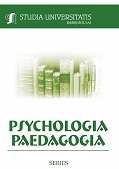A COMPARISON OF STAKEHOLDERS’ VIEWS ON SCIENCE EDUCATION IN ROMANIA AND GERMANY
A COMPARISON OF STAKEHOLDERS’ VIEWS ON SCIENCE EDUCATION IN ROMANIA AND GERMANY
Author(s): Theresa Schulte, Gabriel Gorghiu, Claus BolteSubject(s): Psychology
Published by: Studia Universitatis Babes-Bolyai
Keywords: Science Education; Delphi study; PROFILES project.
Summary/Abstract: Within the framework of the FP7 funded European Project entitled “PROFILES - Professional Reflection Oriented Focus on Inquiry-based Learning and Education through Science”, 22 partner institutions from 21 countries are involved in making efforts to disseminate a modern understanding of scientific literacy and facilitate an uptake of inquiry-based science education (IBSE). Embedded in this project is the International PROFILES Curricular Delphi Study on Science Education, which aims at identifying desirable aspects and shortcomings of modern science education with respect to scientific literacy. In the International PROFILES Curricular Delphi Study on Science Education, different stakeholders’ views on desirable aspects of scientific literacy based science education are by means of the Delphi method collected in three consecutive rounds by the PROFILES partners in 21 different countries. As relevant stakeholders involved with science and science education, these studies include students, pre- and in-service science teachers, science education researchers and scientists. In the first round, the stakeholder’s views in each country were collected in individual statements and through qualitative analyses classified into category systems. In this contribution, the results of the first round from Germany and Romania are compared. The comparison shows that despite cultural differences and different educational systems, similar tendencies can be found in the stakeholders’ views in the two countries.
Journal: Studia Universitatis Babes-Bolyai - Psychologia-Paedagogia
- Issue Year: 60/2015
- Issue No: 1
- Page Range: 59-72
- Page Count: 14

